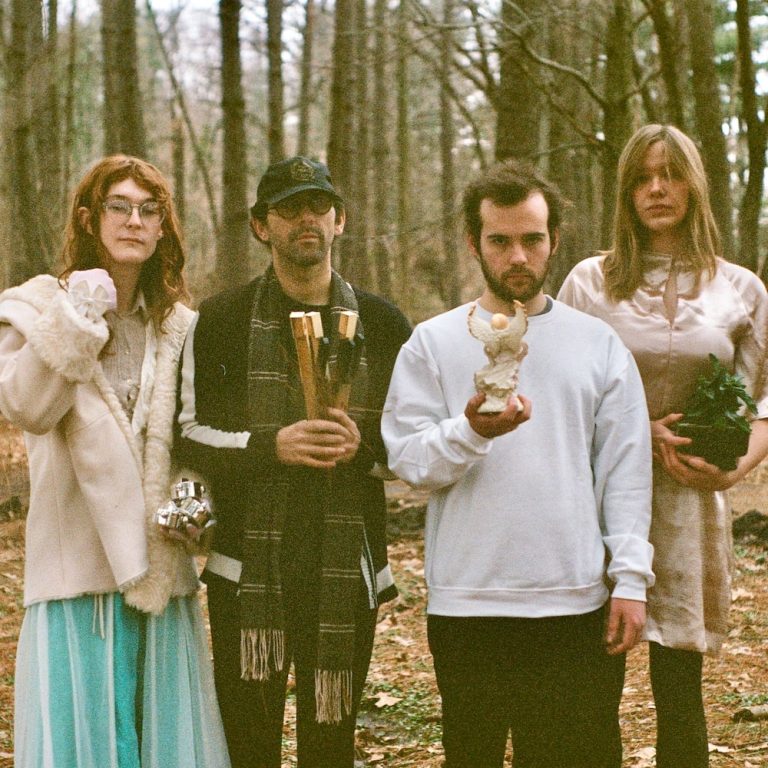If you don’t know the story behind the creation of Tomato Flower’s No, then don’t worry, as it becomes apparent pretty quickly. During the creation of Baltimore-based band’s debut album, co-vocalists Jamison Murphy and Austyn Wohlers broke up, creating a tension that makes near enough every line uttered across its 12 tracks feel like a pointed barb. Listening to the album can feel akin to walking in on an argument between friends and not knowing whether to back away quietly or stand stock still in the doorway in case you make the situation worse by drawing attention to your presence. ”How do you feel?” they asked back on the 2022 track “Fancy”. On No there’s little to no doubt as to the answer to that question.
This makes picking out lines and applying them to this context an easy game in itself. Murphy’s defiant, guttural yelps on lead single “Destroyer” are perhaps the most pointed moment; it feels drawn from a moment of raw emotion, veering away from exactitude and precision and instead funnelling pure vitriol. “I know it’s gonna hurt me still / Without a thought I’m full of hate,” they coarsely indite. At the other end of the record the black bile bubbles up again, asking “Love let it down, why can’t I?” with a forced smile and an air of hopelessness amidst the short burst of anger.
Wohlers, on the other hand, with her airier voice, delivers jabs with a more plainfaced and calm directness, the kind that knows where the jugular is and isn’t afraid to hold a sword to it. “In time I found you started it,” she goads on opening track “Saint” while on “Do It” she addresses the bitterness of never doing what she wanted to do. After taunting an answer out of her target (“Why don’t you show me what you mean? / I already told you how I feel”) she lets out a large exhale at the other end of the song as if to signal she’s done with the bickering and just wants to sit alone in the spaces she always wanted to go.
This tension comes out in the music too. Where there was sweet and brief dreaminess on their early EPs, there are now knotty and prickly contortions of guitar, rhythms and time signatures that have more in common with free jazz than indie pop. “Radical” leads on needly guitar notes before plunging into a discordant abyss; “Temple of the Mind” creates a squall of psychedelic electric guitar squiggles, channelling what feels like a fevered excitement; the switchy “Magdalene” sounds like vintage infomercials from the 70s spliced up; and “No” flaunts an obtuse rhythm that shakes the listener off at each turn.
Gone is the pillowy wash of their first EPs, and tracked for the first time in the studio, a brashness takes over on the album; there seems to be less concern with smoothness and more interest in jarring textures. For the most part, No isn’t any kind of easy listen, but the four piece don’t seem out to make happy-go-lucky indie ditties. The songs here feel like a deconstruction of their music, tangled storms that don’t want to be untied.
Sometimes it all comes together, especially when there seems to be a clear throughline. “Harlequin” is surprisingly breezy, chirpy keys and drops of fun percussion making for a likeable swagger that doesn’t require much attention to the more abstract lyrics. “Lost Lunar One” sports some doomed piano chords that sound picked from a 50s sci-fi movie, and even though the track’s metaphor isn’t treated with much subtlety, it’s forgivable given the not-so-subtle situation looming overhead. Meanwhile 95 second “Destroyer”, with its upfront wrath, is full of charged energy that doesn’t dare stay past its welcome and stands out as the most memorable moment here.
With its references to “stonelight and metal” (inspired by Gerard de Nerval images) “Sally & Me” touches on the crux of the album, the push and pull between band members playing and singing what feel like different songs together at the same time; it’s not so much chalk and cheese as it is firepit and icestorm. Sometimes it feels like the band are lost, trying to keep up with each other, starting and stopping in moments that could be excused as intentional from a certain obtuse angle. (One thinks of the final scene from Whiplash where drummer Andrew Neiman tries to keep up with an avant jazz song he doesn’t know.) Consider No’s album cover: all the band members are stood holding different trinkets, trophies, and possessions. Sure, there’s a fascinating friction here, but often No feels like the members of Tomato Flower playing in their own direction and for their own personal causes.

